Iraq Battles IS in Mosul, Commander Says Resistance Weakening
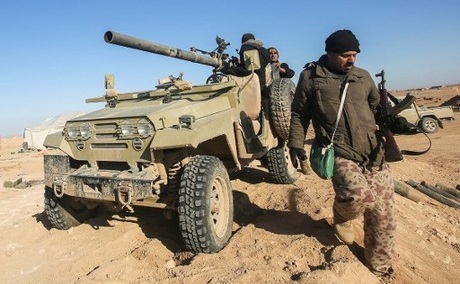
AFP
Iraqi special forces battled the Islamic State group on Friday in west Mosul, where a commander said jihadist resistance is showing signs of weakening under repeated assaults.
The jihadists are also facing simultaneous offensives in Syria by government forces, Turkish-backed rebels and a US-supported alliance of Kurdish and Arab fighters, piling more pressure on IS.
But the battle for Mosul's Old City -- which could see some of the toughest fighting of the operation -- has not yet begun, nor has fighting inside the city of Raqa, IS's main bastion in Syria.
Iraq's Counter-Terrorism Service assaulted the Al-Amil al-Oula neighbourhood of west Mosul early on Friday, and were battling the jihadists inside it, said Staff Major General Maan al-Saadi, a CTS commander.
"The enemy fought fiercely in the first defensive line from Al-Ghazlani base to Wadi Hajar and to Al-Sumood neighbourhood," Saadi said, referring to areas that Iraqi forces have recaptured since launching their assault on west Mosul on February 19.
But "after these neighbourhoods, after we broke the defensive line, they lost many fighters," he said.
"The enemy has begun to collapse. They have lost many of their combat capabilities. Today, the enemy sent (car bombs), but not in the numbers that they sent at the beginning of the battle."
In another sign that the jihadists are feeling the squeeze, their chief Abu Bakr al-Baghdadi was reported to have abandoned Mosul, leaving local commanders behind to oversee IS's defence of the city.
"He was in Mosul at some point before the offensive.... He left before we isolated Mosul and Tal Afar," a town to the west, a US defence official said.
"He probably gave broad strategic guidance and has left it to battlefield commanders."
Baghdadi, who declared IS's cross-border "caliphate" at a Mosul mosque in 2014, urged supporters in an audio message in November to make a stand in the city rather than "retreating in shame".
Iraqi forces launched their operation to retake Mosul in October, and recaptured the whole east bank of the Tigris River that runs through it in January.
- More than 215,000 displaced -They then set their sights on the smaller but more densely populated west side of the city.
More than 215,000 people are currently displaced as a result of the battle for Mosul, according to the International Organization for Migration. Others fled their homes but later returned.
Almost a quarter of the displaced -- more than 50,000 people -- have fled west Mosul since February 25, the IOM said.
But that is only a small fraction of the 750,000 civilians estimated to have stayed on in west Mosul under IS rule.
The United States has led a coalition that has been carrying out air strikes against IS in both Iraq and Syria since mid-2014, as well as providing military advisers, trainers and artillery support.
Washington has turned up the heat on IS in Syria too, more than doubling its troops numbers in the country with the deployment of 400 reinforcements to back the offensive on Raqa.
Some 500 US military advisers were already deployed alongside the Syrian Democratic Forces, an alliance of Kurdish and Arab fighters that Washington regards as the force best equipped to drive IS from its stronghold.
- Feuding US allies -But the operation is complicated by the implacable opposition to the SDF of US NATO ally Turkey, which is leading a rival offensive against IS in northern Syria.
Ankara regards the dominant force within the SDF, the Kurdish People's Protection Units (YPG), as a terrorist organisation, because of its links to a Kurdish rebel group that has waged a deadly 33-year insurgency in southeastern Turkey.
Ankara has said its intervention is aimed as much against the YPG as against the jihadists of IS and there have been repeated clashes between Turkish forces and the Kurdish militia.
Asked about the standoff at a hearing of the Senate Armed Services Committee on Thursday, the top US commander for the region, General Joseph Votel, acknowledged that tensions between Ankara and the Kurds were near the breaking point.
Efforts have been made to address the issue at a military level, "and there has to be an effort at the political level to address this," Votel said.
Some of the US troop reinforcements being sent to Syria are to be deployed to SDF-held areas near the front line to deter further clashes between Turkish forces and Washington's Kurdish-Arab allies.
The chairman of the Joint Chiefs of Staff, General Joseph Dunford, has made two recent trips to Turkey to try to defuse the tensions.
Latest News
-
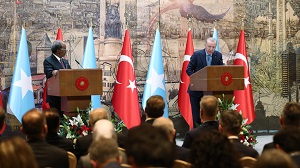 Turkey calls 'Israel's' recognition of Somaliland 'illegitimate'
Turkey calls 'Israel's' recognition of Somaliland 'illegitimate'
-
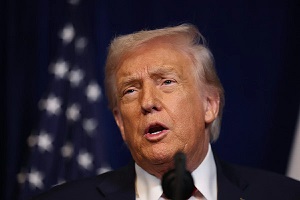 Trump warns Hamas, Iran after Netanyahu talks
Trump warns Hamas, Iran after Netanyahu talks
-
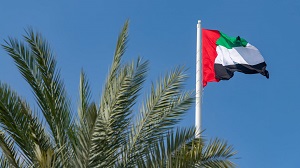 UAE denies Saudi accusation of fuelling Yemen conflict
UAE denies Saudi accusation of fuelling Yemen conflict
-
 Syria reveals new post-Assad banknotes
Syria reveals new post-Assad banknotes
-
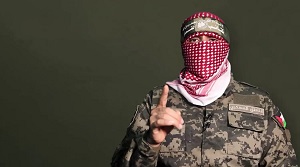 Hamas Armed Wing Refuses to Surrender Weapons, Confirms Spokesman Killed by Israel in August
Hamas Armed Wing Refuses to Surrender Weapons, Confirms Spokesman Killed by Israel in August